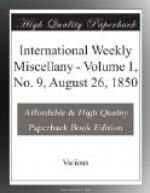Fortunately it is out of the power of the most perverse theory to spoil the true poet. The poems of Wordsworth must continue to charm and elevate mankind, in defiance of his crotchets, just as Luther, Henri Quatre, and other living impersonations of poetry do, despite all quaint peculiarities of the attire, the customs, or the opinions of their respective ages, with which they were imbued. The spirit of truth and poetry redeems, ennobles, hallows, every external form in which it may be lodged. We may “pshaw” and “pooh” at Harry Gill and the Idiot Boy; but the deep and tremulous tenderness of sentiment, the strong-winged flight of fancy, the excelling and unvarying purity, which pervade all the writings of Wordsworth, and the exquisite melody of his lyrical poems, must ever continue to attract and purify the mind. The very excesses into which his one-sided theory betrayed him, acted as a useful counter-agent to the prevailing bad taste of his time.
The Prelude may take a permanent place as one of the most perfect of his compositions. It has much of the fearless felicity of youth; and its imagery has the sharp and vivid outline of ideas fresh from the brain. The subject—the development of his own great powers—raises him above that willful dallying with trivialties which repels us in some of his other works. And there is real vitality in the theme, both from our anxiety to know the course of such a mind, and from the effect of an absorbing interest in himself excluding that languor which sometimes seized him in his efforts to impart or attribute interest to themes possessing little or none in themselves. Its mere narrative, though often very homely, and dealing in too many words, is often characterized also by elevated imagination, and always by eloquence. The bustle of London life, the prosaic uncouthness of its exterior, the earnest heart that beats beneath it, the details even of its commonest amusements, from Bartholomew Fair to Sadler’s Wells, are portrayed with simple force and delicate discrimination; and for the most part skillfully contrasted with the rural life of the poet’s native home. There are some truthful and powerful sketches of French character and life, in the early revolutionary era. But above all, as might have been anticipated, Wordsworth’s heart revels in the elementary beauty and grandeur of his mountain theme; while his own simple history is traced with minute fidelity, and is full of unflagging interest.
We have already adverted to the fact that this Prelude was but the overture to a grander song which the poet has left, in a great measure, unsung. Reverting to this consideration an important fact seems to force itself upon our notice. The creative power of Wordsworth would appear to have been paralyzed after the publication of his Excursion. All his most finished works precede that period. His later writings generally lack the strength and freshness which we find in those of an earlier date. Some




